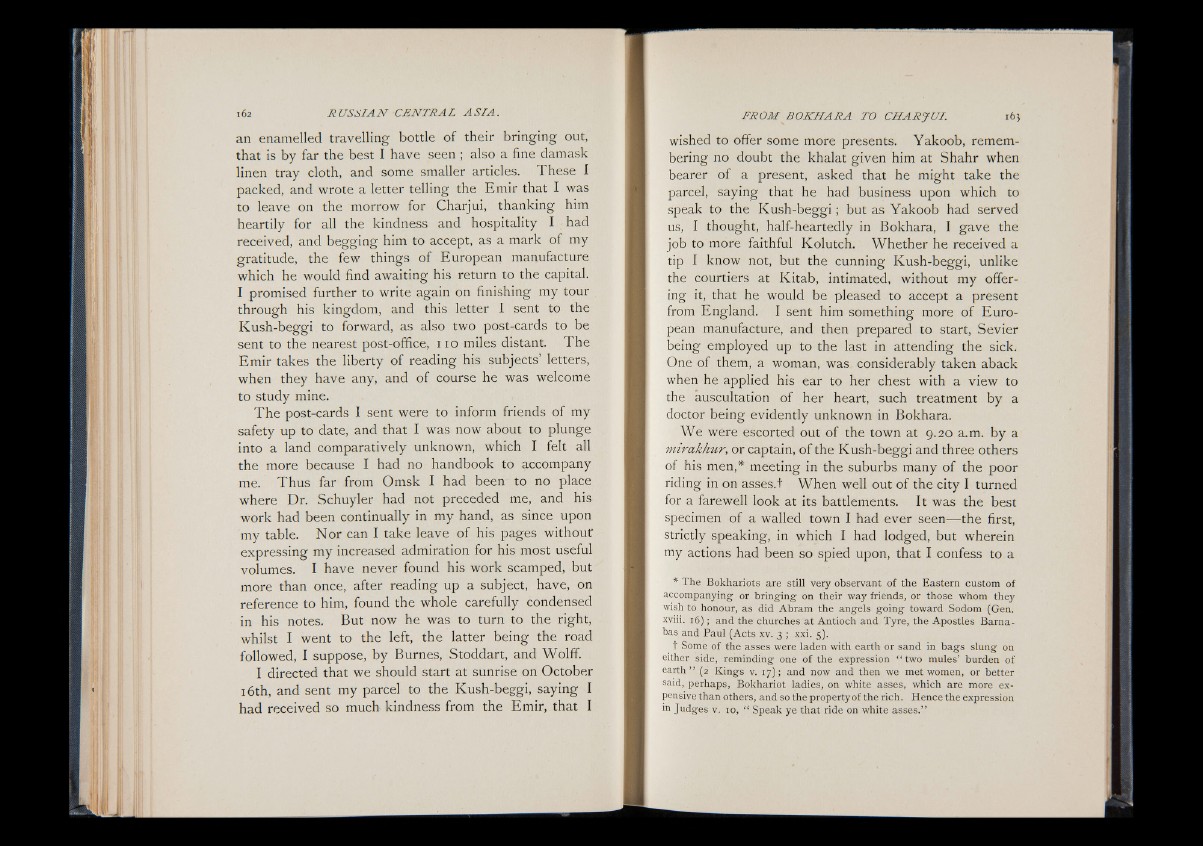
an enamelled travelling bottle of their bringing out,
that is by far the best I have seen ; also a fine damask
linen tray cloth, and some smaller articles. These I
packed, and wrote a letter telling the Emir that I was
to leave on the morrow for Charjui, thanking him
heartily for all the kindness and hospitality I had
received, and begging him to accept, as a mark of my
gratitude, the few things of European manufacture
which he would find awaiting his return to the capital.
I promised further to write again on finishing my tour
through his kingdom, and this letter I sent to the
Kush-beggi to forward, as also two post-cards to be
sent to the nearest post-office, 1 10 miles distant. The
Emir takes the liberty of reading his subjects’ letters,
when they have any, and of course he was welcome
to study mine.
T he post-cards I sent were to inform friends of my
safety up to date, and that I was now about to plunge
into a land comparatively unknown, which I felt all
the more because I had no handbook to accompany
me. Thus far from Omsk I had been to no place
where Dr. Schuyler had not preceded me, and his
work had been continually in my hand, as since upon
my table. Nor can I take leave o f his pages without
expressing my increased admiration for his most useful
volumes. I have never found his work scamped, but
more than once, after reading up a subject, have, on
reference to him, found the whole carefully condensed
in his notes. But now he was to turn to the right,
whilst I went to the left, the latter being the road
followed, I suppose, by Burnes, Stoddart, and Wolff.
I directed that we should start at sunrise on October
16th, and sent my parcel to the Kush-beggi, saying I
had received so much kindness from the Emir, that I
wished to offer some more presents. Yakoob, remembering
no doubt the khalat given him at Shahr when
bearer of a present, asked that he might take the
parcel, saying that he had business upon which to
speak to the Kush-beggi; but as Yakoob had served
us, I thought, half-heartedly in Bokhara, I gave the
job to more faithful Kolutch. Whether he received a
tip I know not, but the cunning Kush-beggi, unlike
the courtiers at Kitab, intimated, without my offering
it, that he would be pleased to accept a present
from England. I sent him something more of European
manufacture, and then prepared to start, Sevier
being employed up to the last in attending the sick.
One of them, a woman, was considerably taken aback
when he applied his ear to her chest with a view to
the auscultation of her heart, such treatment by a
doctor being evidently unknown in Bokhara.
We were escorted out of the town at 9.20 a.m. by a
mirakhur, or captain, of the Kush-beggi and three others
of his men,* meeting in the suburbs many of the poor
riding in on asses.t When well out of the city I turned
for a farewell look at its battlements. It was the best
specimen of a walled town I had ever seen— the first,
strictly speaking, in which I had lodged, but wherein
my actions had been so spied upon, that I confess to a
* The Bokhariots are still very observant of the Eastern custom of
accompanying or bringing on their way friends, or those whom they
wish to honour, as did Abram the angels going toward Sodom (Gen.
xviii. 16); and the churches at Antioch and Tyre, the Apostles Barnabas
and Paul (Acts xv. 3 ; xxi. 5).
t Some of the asses were laden with earth or sand in bags slung on
either side, reminding one of the expression » two mules’ burden of
earth” (2 Kings v. 17); and now and then we met women, or better
said, perhaps, Bokhariot ladies, on white asses, which are more expensive
than others, and so the property of the rich. Hence the expression
m Judges v. 10, “ Speak ye that ride on white asses.”